Humanities & Social Sciences
Of Oracy, Orature, Textology and Clapping Chairs
Published
12 years agoon
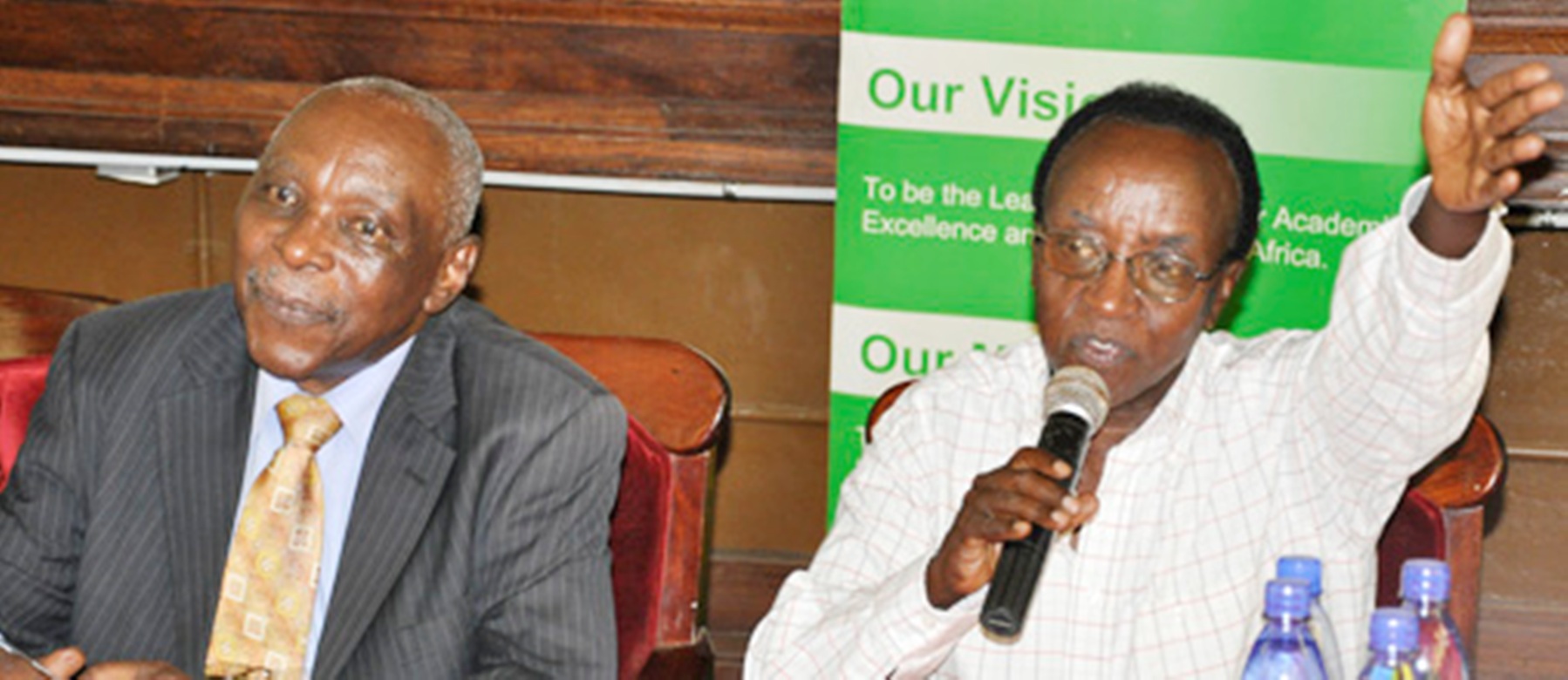
The organizers of the Public Dialogue on Literature had promised that the event would give a rare and valuable platform to two important, respected and celebrated East African scholars with long and glorious careers in the world of letters to share with the public. This message seems to have singularly struck home with the audience for by 2:00pm on Friday 4th April 2014; almost every seat in the Main Hall, Makerere University had already been taken up. And just like a seasoned stage-manager, the man tasked with keeping the audience guessing, Dr. Danson Kahyana kept engaging them, all the while checking to see that all was set for the day’s event until finally, in they walked; the larger than life figures whose literary reputation preceded their every step, led by the Principal College of Humanities and Social Sciences (CHUSS), Professor Edward Kirumira.
To the casual observer whose judgment is solely based appearance, they looked harmless, too normal, too humble and overly courteous as they made rounds shaking hands with as many old friends as they could reach. Could these surely be the men of whom all those moving tales and fables had been penned? Could these two gentlemen we were even a little hesitant to take up their places at the high table truly be the famous duo of Professor Arthur Gakwandi and Mwalimu Austin Bukenya?
All this doubt were instantly dispatched the moment Dr. Susan Kiguli, Head of the Literature Department, CHUSS took to the podium and began sharing some decadal anecdotes. Of a Scholar in the 1970s; Professor Ali Mazrui, whose presentations on political science would leave even the chairs in the Main Hall clapping; of two Professors – one a fire-spiting socialist by the name of Mahmood Mamdani and another a consuming capitalist by the name of Apolo Nsibambi who in the 1980s held the Makerere audiences at ransom with their debates; and of a Professor by the name of Okot p’Bitek who would awaken all sleeping interest by dancing atop tables and playing his nanga (harp). By this time, the audience that was literally eating out of her palm was further spellbound by her narrations on discovering the life form of these legends, on joining Makerere as an undergraduate student.
“Professor Wangusa, who quoted T.S. Eliot like he was his next of kin…Professor Rubadiri, who was under the impression that all 150 students attending his class were registered for it, only to discover at the time of coursework that 100 of those had come to hear him pour forth poetry…” said Dr. Kiguli, further captivating her audience. She paid tribute to the day’s speakers for “coming back home” and to the Office of the Deputy Vice Chancellor (Academic Affairs) for sponsoring the day’s Public Dialogue.
Dr. Aaron Mushengyezi, the Dean, School of Languages, Literature and Communication, CHUSS then welcomed the academic twins; in reference to both of the Speakers who recently turned 70, to Makerere. He then paid personal tributes to Prof. Arthur Gakwandi who in 1992 signed his academic life certificate by endorsing his registration for a “forbidden” combination of subjects on the BA programme and to Mwalimu Austin Bukenya for the mentorship he accorded him during his early days as an academic staff. “The values that these two eminent Professors exhibited to me were their humility and simplicity [which values are unmistakable] even as you look at them today” he added.
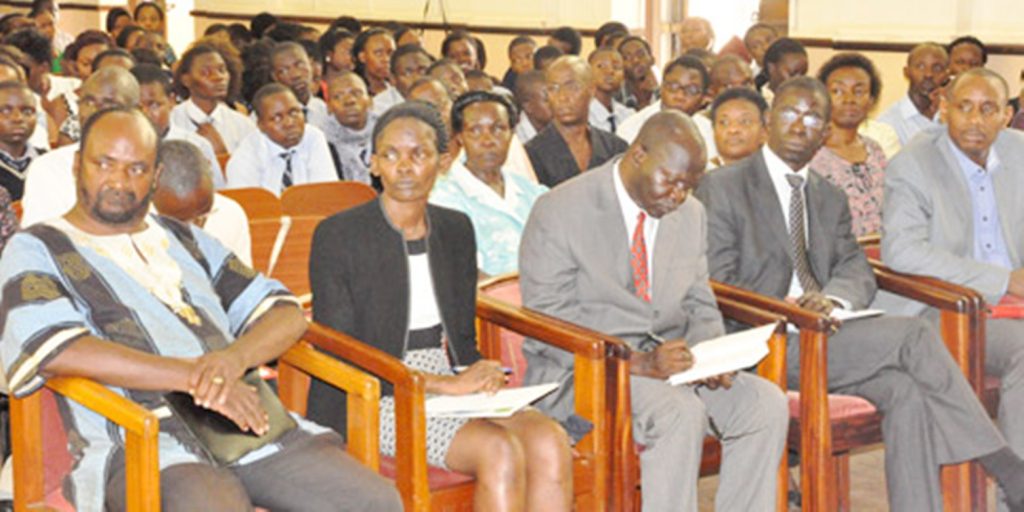
The College of Humanities and Social Sciences is the cradle of the Arts in Makerere University. As such, the Principal, Prof. Edward Kirumira could not hold back his pride as he warmly welcomed back his own. “We appreciate the time that our two Speakers are putting aside to come back and do what they are supposed to do; to mentor us and tell us that before we get to their age, we must continue to share our knowledge,” said Prof. Kirumira.
He encouraged the audience to borrow a leaf from the day’s Speakers by reflecting upon how they had used their respective lives and opportunities to make a lasting impression on society. Prof. Kirumira then challenged the staff to always ensure that they have mentored their younger colleagues to carry on with the great work when that time to retire finally comes knocking.
With the day’s formalities complete, it was now time for the Chairperson to take the Public Dialogue to the next level. This was the moment that the audience had eagerly anticipated all day and it was up to Prof. Abasi Kiyimba to deliver. His choice to initiate by first of all reminding everyone of the day’s topic: Literature and the Crisis in the Humanities was simple but artful. He then proceeded to impress it upon the audience that they each had a role to play beyond the day’s dialogue in as far as coming up with a solution to the crisis. Nevertheless as the Deputy Principal, CHUSS in an era where the voice of Humanities is being drowned out by the Sciences debate, he took this opportunity to make his case, “Occasions like these are our opportunity to demonstrate that we have ideas that can build this country,” and turning to the day’s Speakers, he dropped the gauntlet “speak about your vision of society and the role of literature.”
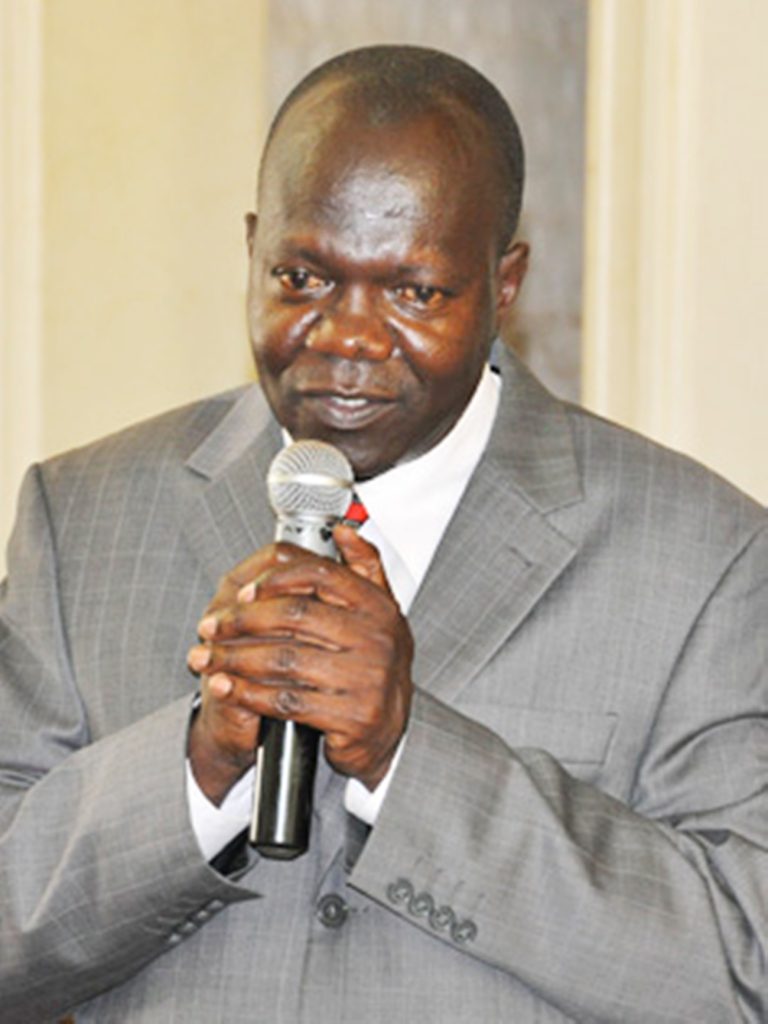
First up was Professor Arthur Gakwandi who spoke in a moderate but deliberate tone, true to his diplomatic background. After thanking the organizers for the great honour and opportunity to speak to the public, he quickly drew first blood with his statement, “The Humanities are not in a crisis.
“With ears in the audience peaking higher and increased activity as sitting positions were readjusted, Prof. Gakwandi went on to defend his stance by noting that crises speak of danger that comes with an element of surprise leaving the parties only a short time to decide on a course of action. He further noted that since the present state of affairs has been with us for well over a decade, the crisis attribute was therefore unjustifiable. He further backed this up with the existence of books on the subject like Crisis in the Humanities by J.H. Plumb first published in 1964, almost 50 years ago.
“Humanities are not in a crisis, they are facing challenges. They have faced challenges before and they should stand up and look forward with confidence because the contribution to society that they make is likely to remain important,” emphasized Prof. Gakwandi. He then went on to quote his late Professor of Literature, David Cook’s inaugural public lecture in the Main Hall in 1971
“An advanced study of Literature equips a student to think widely, deeply and flexibly on all human affairs and means of expression and is therefore an appropriate intellectual basis for professional men and women in many fields of public service”
Reflecting on the works of Matthew Arnold a British poet and cultural critic, Prof. Gakwandi noted that Literature had a role to play as a vital ingredient in society “Literature embodies values, interprets experience and makes the mind more imaginative, and therefore is valuable not only for those who study it but also for those who read it for pleasure… even if you are a scientist, you can share something from literature by reading and it will save you from some more vulgar forms of entertainment,” he counseled.
A fresh retiree from Makerere University, Prof. Gakwandi appreciated the important foundation that his background in Literature training laid for his 15 years of Diplomatic service. He also noted that he had seen many of his former students taken on roles of responsibility in many other fields such as politics and the media, especially as Chief Editors, “many of these people have risen to the top thus vindicating their Education in Literature at Makerere,” he substantiated.
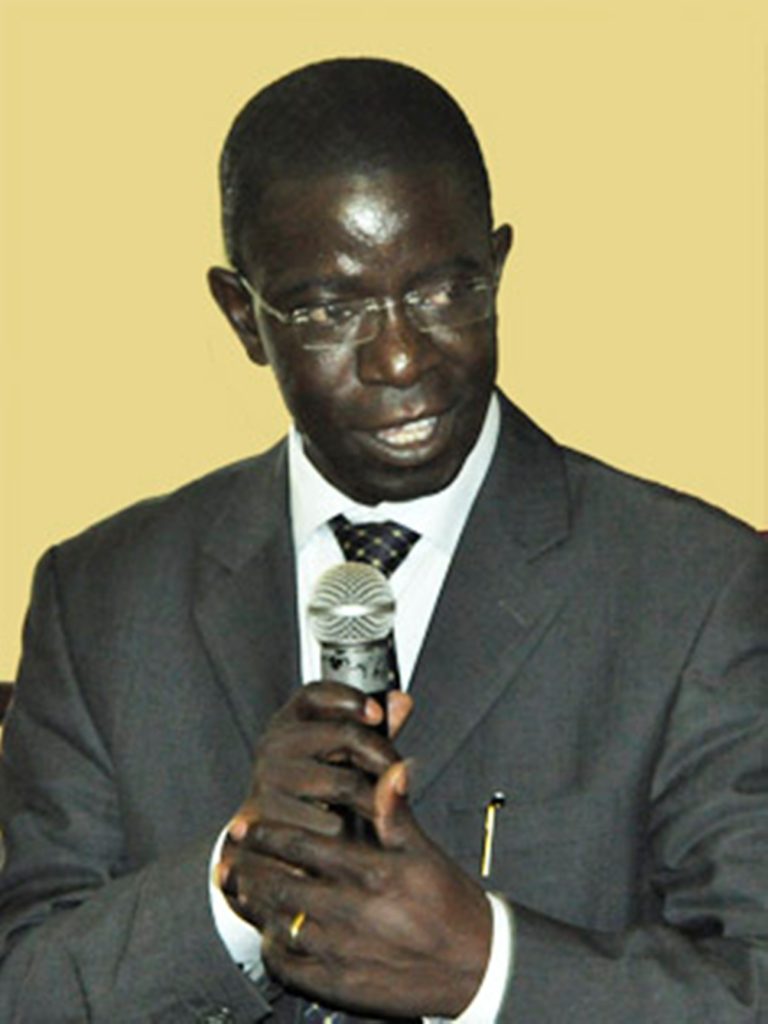
As he concluded his submission, Prof. Gakwandi however warned that the Teachers of Literature ought to adapt their styles to the changing times and circumstances in our society, “I am especially thinking about the influence of bad journalism, facebook, twitter and social media on the way we speak and write.” Prof. Gakwandi also warned on the tendency of compartmentalizing the various disciplines in the Arts to the exclusion of others, “We need to see more interdisciplinarity because whether you study History or Political Science or Literature, you are studying the same society from different perspectives,” further adding that “I think we ought to borrow a little more from each other, teachers of language should use literary text to teach language and Lecturers in Literature should pay more attention to Language Communication skills and courses should be offered across the boundaries of these disciplines and that is when we shall move forward in promoting the values of the Humanities,” said Prof. Gakwandi in ending.
Next up was Mwalimu Austin Bukenya, a leading authority on Oracy and African Orature who straight away paid tribute to his training at the University of Dar-es-salaam by addressing the gathering in Kiswahili. He then commended the audience for “voting with their feet for Literature” by turning up in overwhelming numbers. Mwalimu Bukenya proposed that the Public Dialogue be dedicated to a literary colleague Prof. Christopher Lukorito Wanjala who was celebrating his 70th birthday on that day. He further emphasized that although the Public Dialogue had been organized as a way of bidding the Professors farewell, he preferred that the Swahili ni kwaheri ya kuonana (until the next time) reference be used instead of the academic parlance reference of valedictory lectures.
In a bid put an end to the “backward and primitive way of referring to Literature as quoting Shakespeare to one another”, Professor Bukenya or Mwalimu is he’s fondly known in the literary circles put forth four definitions of Literature as: i) a form of artistic communication using language as its medium, the artistic bit fusing observation, imagination and precise distinctive expression – literature is iconic, it calls attention to itself; ii) texts – anything that is written – literate e.g. Mathematical literature. There also exist oral/orate/unwritten texts that come from oracy (the skill of the spoken word) and orature (the creativity of the spoken word); iii) in broader modern literature – anything that signifies e.g. the clothes one wears and their implication hence
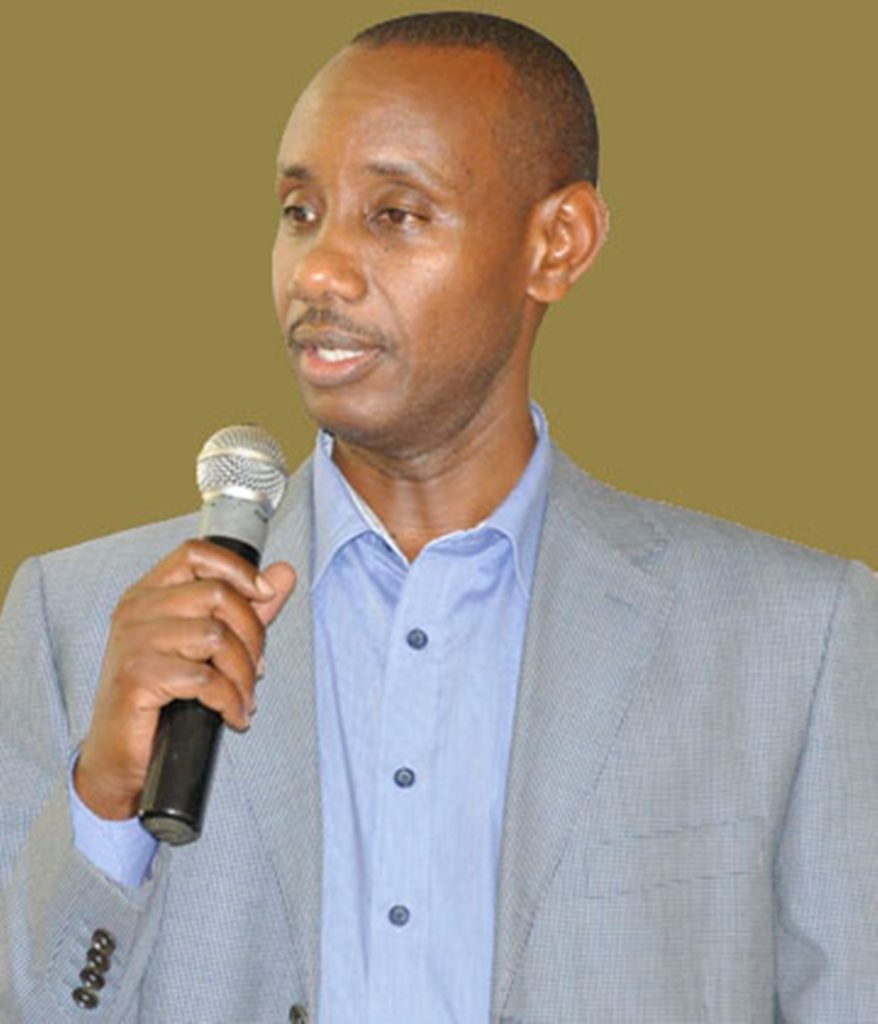
Mwalimu however sought to clearly point out that by the Humanities being in a crisis; they are in a state of concern, “That crisis is a false positing of Arts versus Sciences. That has created a state of crisis. Can we really say it is either Arts or Sciences?” pondered Prof. Bukenya. He further noted that the policy makers have over the years been gradually diminishing almost to negligible levels the sponsorship of students in the arts, “It is not only the funding that is going down but also the public pronouncements on the same,” Prof. Bukenya further added terms like appropriate dressing and iv) concerned with the studying of all texts in their signifying modes which pertains to textology (using texts as communicating systems to uncover and describe grammar) and one of Mwalimu’s coining of the day testectics (the mechanics of the word/text)
He noted that this has driven the teachers of the Arts so hard against the wall that even the mode of teaching has changed. “People seem to be so thoroughly concerned with just learning things and writing exams that our effectiveness has become questionable, especially in the areas of language and literature,” lamented Mwalimu. He noted that this teaching has led to students being exam-oriented which leads to conclusions like our graduates are unemployable.
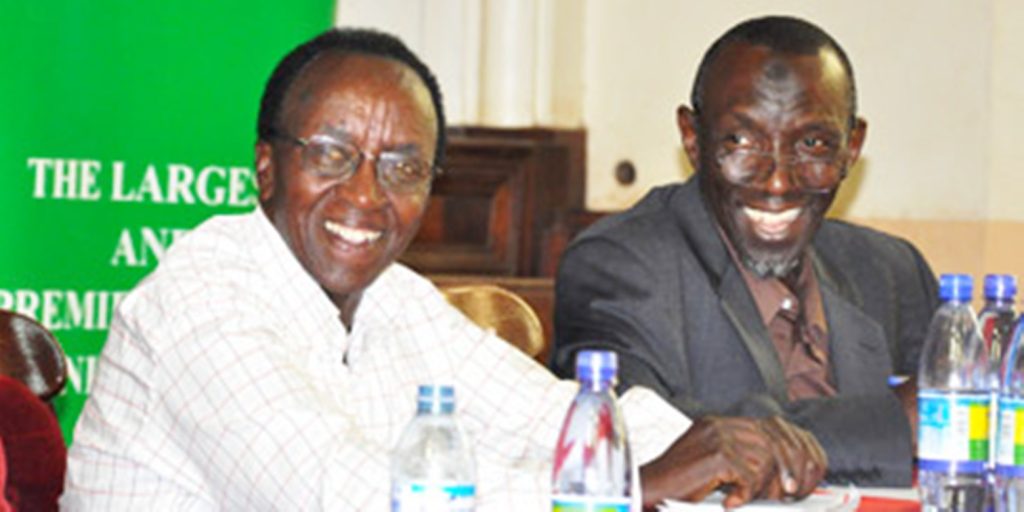
Prof. Bukenya stressed the need to continue prioritizing the Humanities as they are those activities and studies that are primarily concerned with human relationships. “What I propose is that we should have both Sciences and Humanities. This comes from a theory in Literature – to deconstruct which does not seek to destroy but instead break up and rearrange,” he elaborated, further adding that “We cannot afford to have a person today who is purely a Humanist without a Science competence or else we are developing an articulate caveman. Equally importantly, we cannot have a Scientist who is purely a whiz in chemical formulae without a human side otherwise he will be just a robot.”
He further reiterated the notion that Literature is the most humane of the humanities because it deals with human relationships and as such can used to best illustrate their importance. Mwalimu sought to give the audience a deeper appreciation of his field by speaking about Literature as phatic communion as is the reference in advanced literary theory. This communion he said goes beyond simply making a connection through speech but going further to establish and maintain a relationship. “When someone says how are you or wasuze otya, it is not because they want you to describe exactly what bed you slept in but they are establishing a relationship and trying to maintain that relationship,” elaborated Prof. Bukenya.
He then delved into other branches of Literature like para-literature pertaining to films and songs further noting that, “People cannot do without these, and you have to ask yourself why? This all points to the phatic communion that makes us empathise and symphatise with our fellow human beings,” he explained. As a demonstration of phatic communion, Mwalimu then recited his Swahili translation of The Lonely Soul a poem written by a West African poet. He then sought to further dispel the unjustified generalizations that people in the Humanities do not create jobs.
Treading ever so lightly, Mwalimu then gave the Faith Industry; the fastest growing industry in the country today as a valid example, “I cannot say everyday but we can be sure that every week a new Church is coming up in Uganda. You cannot say that Churches are not job creators. Wherever you have a Church, you have a Pastor, Assistant Pastor, Choir Members, Counsellors, Intercessors and so on… the question we then ask is if you deny a person who seeks to study Religious Study sponsorship, who is going to professionally run those Churches? How many have got trained scriptural scholars, theologians and so on? No wonder we keep saying if we have so many Churches, why then do we have so many thieves or so much corruption? Is it because the Churches are not run by professionally competent people? We could do the same in Music Dance and Drama, how many professionals do we have?” Mwalimu questioned as the audience struggled to contain themselves.
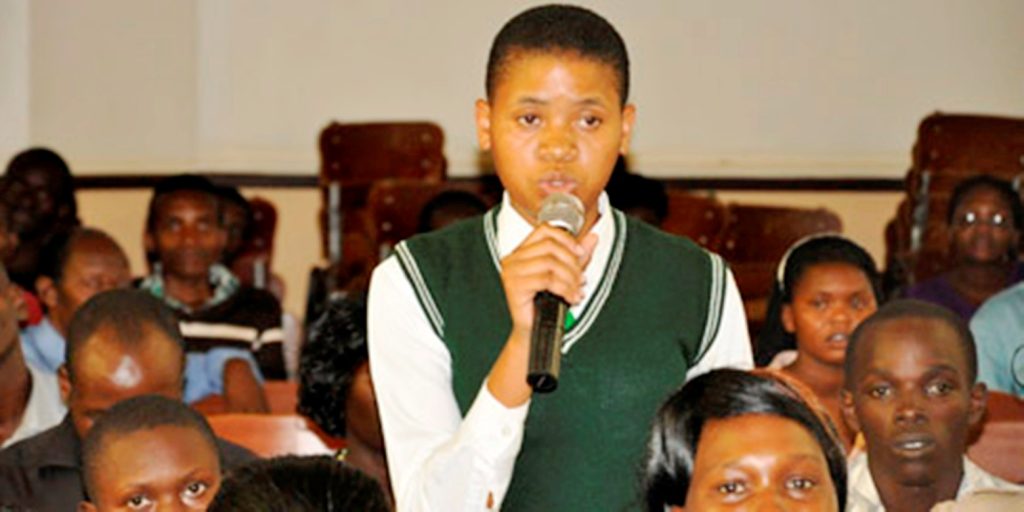
He also touched on the distorted expectation of the university, noting that “A University is supposed to educate people. It is not a technical school. This is the mistake we make when we swallow up our polytechnics and make them universities,” lamented Prof. Bukenya as the audience stomped their feet. “People who want to acquire technical skills should go to technical institutions not universities. The university is a training place for thinking people, creative people, and imaginative people and maybe we should think of restructuring our education system to make our first degree more generalized to create an educated person who can then go on to technical training. This is just what we are trying to do when we train Literature. We have various specific theories of Textology where we use the speech act theory which consists of Elocution – what we utter, Illocution – what we intend and Perlocution – what you achieve. The literature person is a trained individual who can perform many duties and the demand is there,” elucidated Prof. Bukenya.
He thanked the audience for their patience and was confident that this event was only just the beginning “I am sure that we are only initiating the dialogue and I hope that it will continue” he summed up.As he brought his presentation to a close Mwalimu cautioned the audience to guard against the sinister intentions of international sponsors who are urging Governments to train Scientists and forget the Arts, “Because they know they can create their hordes of scientists and recolonise us, what we call ukoloni mamboleo [neocolonialism] because those people that go [solely] into technical things will have the ‘technical know-who’ but lack the ‘technical know-why’ to ask provocative questions,” preached Mwalimu. “It is only the political scientist who is going to ask those questions and it is not in their interest to cater for our culture, for critical people who will ask questions and we’ll be a damned generations which cannot ask questions and we need to guard against that,” added Mwalimu.
The debate then shifted to the floor where members of the audience were given the chance to ask related questions that ranged from the inspiration behind some of the Speakers’ publications to why Literature was glaringly absent from the modern day homes in all its forms. In their responses the Speakers challenged the audience to derive their own meanings from the publications as is the true spirit of literature, “Trust the tale, not the artist and books don’t have meaning save for the meaning you derive out of them” were some of the words of wisdom dispensed by both Speakers. They also challenged the audience to reintroduce literature in all its forms back into their homes, “Wherever there is a bottle of beer, there should be a bookcase, and we should make books a part of our lives.”
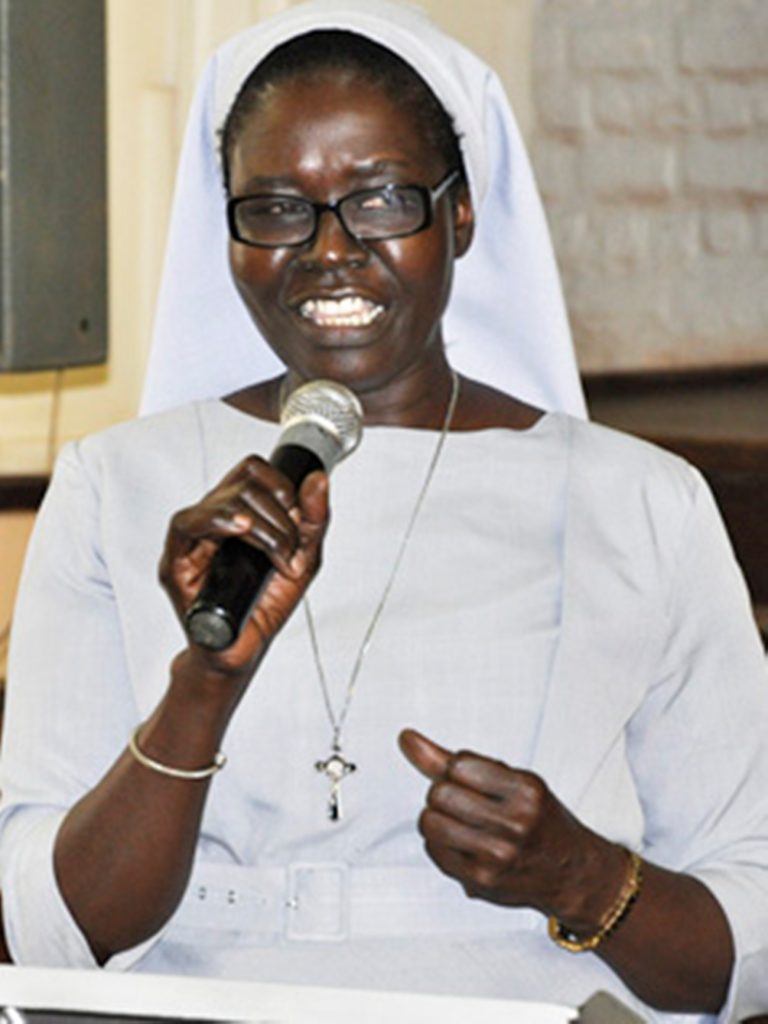
In his closing remarks, the Deputy Vice Chancellor (Academic Affairs), Dr. Ernest Okello Ogwang, himself an Associate Professor of Literature and accomplished publisher, profusely thanked the Day’s Speakers Prof. Bukenya, Prof. Gakwandi as well as the session Chairman Prof. Kiyimba for ably illustrating that literary culture has played and will continue to play a prominent role in shaping the East African region. He also thanked his three aforementioned mentors for the wonderful set of words of wisdom that were delivered in the true spirit of orature.
He however challenged the audience to ride on the spark that the dialogue had ignited, “There is some kind of crisis in the Humanities but it must not be defined for us by others. What is our role in this crisis? Can we reconfigure it for the good of the younger people?” the DVC-AA asked the audience, before summarily adding “I think so.”
In moving a vote of thanks to the day’s speakers and indeed to everyone present, Sr. Dr. Dominic Dipio, Associate Professor of Literature, CHUSS acknowledged the respective contributions to the success of the Literature Public Dialogue by the Deputy Vice Chancellor (Academic Affairs), Dr. Ernest Okello Ogwang, the Principal CHUSS, Prof. Edward Kirumira, the Dean School of Languages Literature and Communication, Dr. Aaron Mushengyezi, the Head, Literature Department, Dr. Susan Kiguli as well as all members of the organizing committee. She further appreciated that the Humanities were steadily coming to the fore of the University leadership and hoped that this would help reinforce their importance to society. Sr. Dr. Dipio then commended the Speakers Prof. Arthur Gakwandi and Mwalimu Austin Bukenya for elaborately handling the day’s topic and continuing to keep the Literature torch aflame through their continued and mentorship and involvement in the literary circles.
Assoc. Prof. Okello Ogwang then took this opportunity to recognize other legendary names in the literary circles like Prof. Ruth Mukama and Prof. Theo Luzuka and acknowledge their respective contributions to mentoring writers in the Department of Literature, Makerere University and beyond.
Article and Pictures by Public Relations Office
Special thanks to @nyanaKakoma
You may like
-
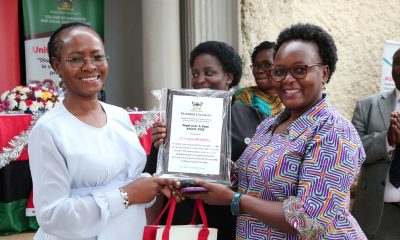

Dr. Pamela Khanakwa Honored for Steering Record 18 PhD Candidates for the Mak 2026 Graduation
-
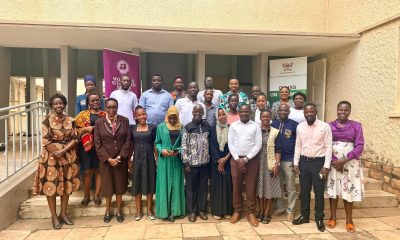

Ugandan Journalists Trained on Peace and Gender-Sensitive Reporting Ahead of 2026 Elections
-
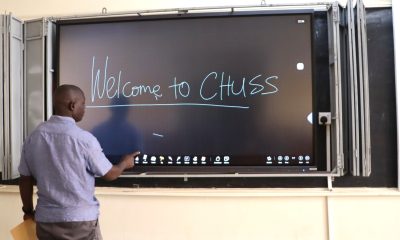

CHUSS Invests Over UGX 100 Million in Interactive Smart Screens, Upgrades Teaching Infrastructure
-
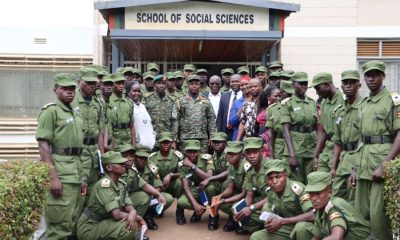

Over 130 Cadet Officers Oriented on Library Use at Makerere University
-


College of Humanities and Social Sciences Launches Five Groundbreaking Publications
-
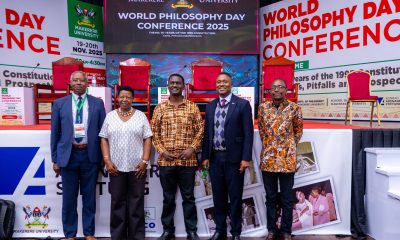

Justice Egonda Urges Makerere Scholars to Lead Constitutional Review, develop National Scorecard for Public Office Performance
Humanities & Social Sciences
Dr. Pamela Khanakwa Honored for Steering Record 18 PhD Candidates for the Mak 2026 Graduation
Published
4 weeks agoon
January 23, 2026By
Jane Anyango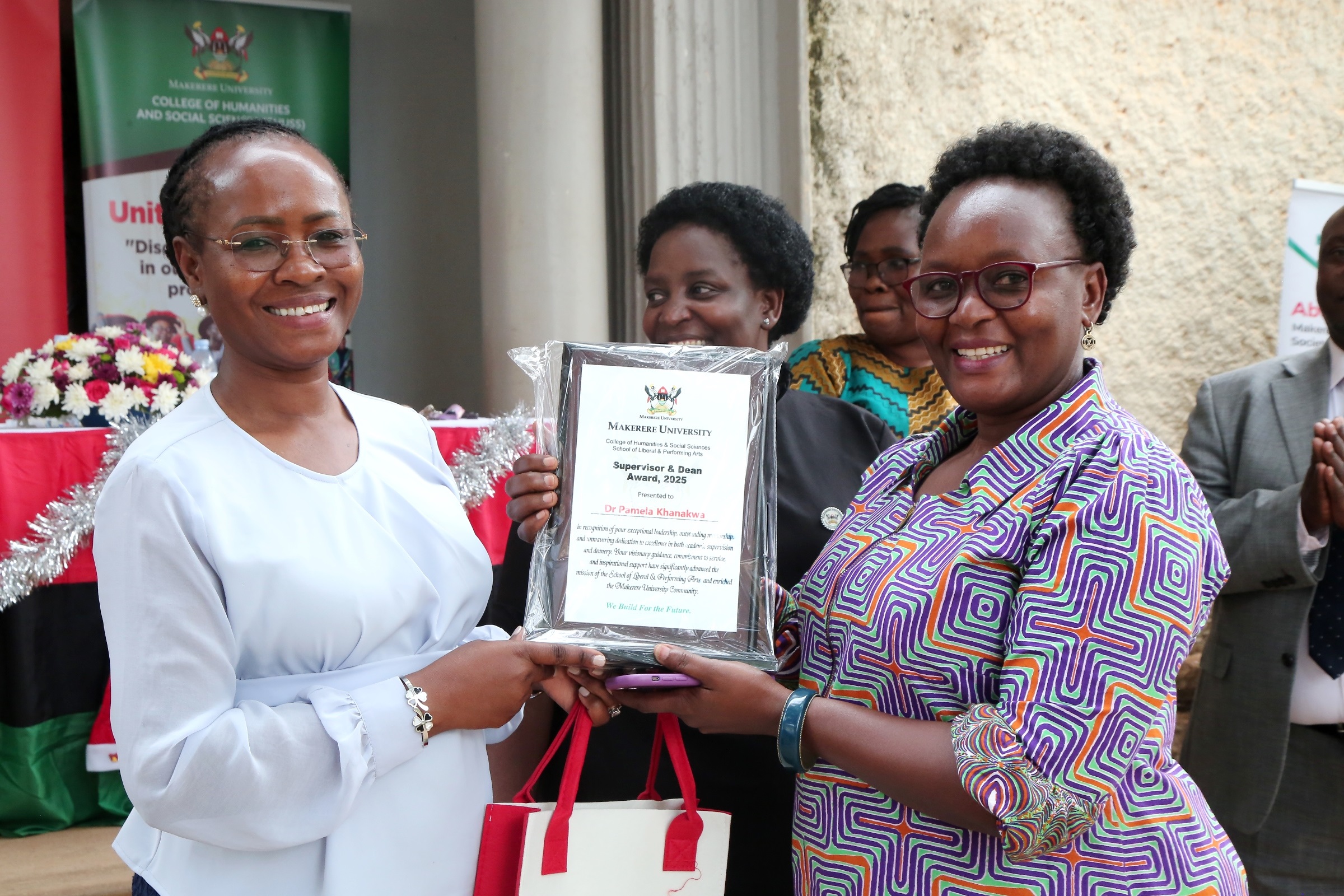
Six personally supervised, three completed in record time, as School of Liberal and Performing Arts sets a historic milestone. Dr. Pamela Khanakwa got the Award as Best PhD Supervisor and Dean
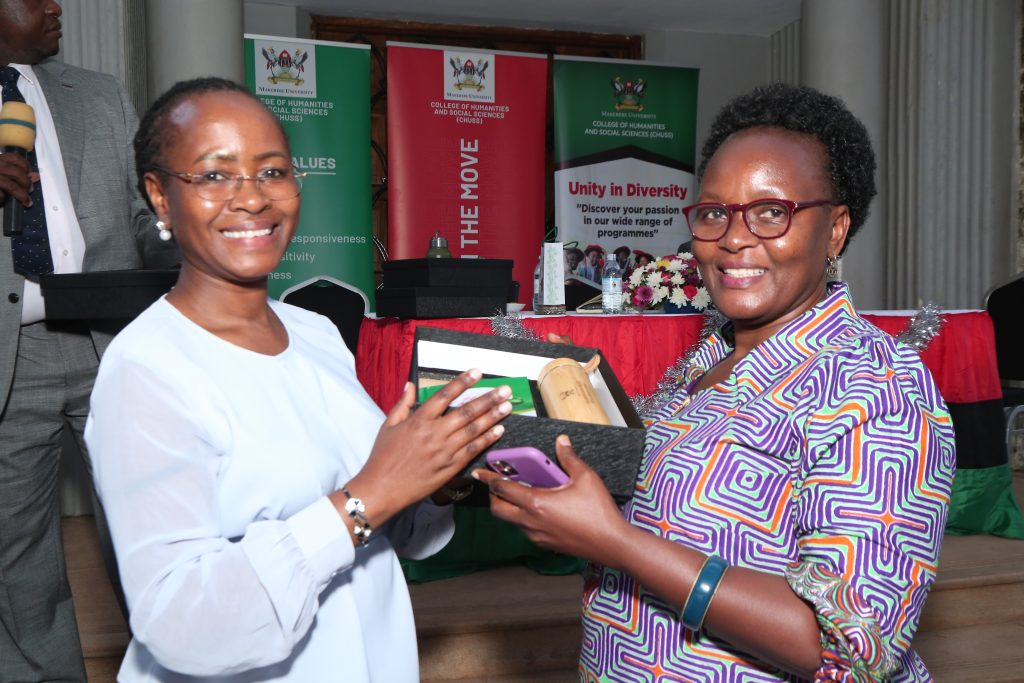
A Historic Academic Milestone for SLPA
The College of Humanities and Social Sciences (CHUSS) recognised the Dean of the School of Liberal and Performing Arts (SLPA), Dr. Pamela Khanakwa, for outstanding academic leadership that has seen the School field 18 PhD candidates for the next 2026 Makerere University Graduation Ceremony scheduled for 24th-27th February. Remarkably, six of these doctoral graduates were directly supervised by Dr. Khanakwa, with three completing within the official three-year timeframe, an exceptional achievement in graduate training. The recognition was announced during the CHUSS End-of-Year Get-Together, where staff applauded Dr. Khanakwa’s dedication, humility, and relentless commitment to postgraduate supervision and timely completion.
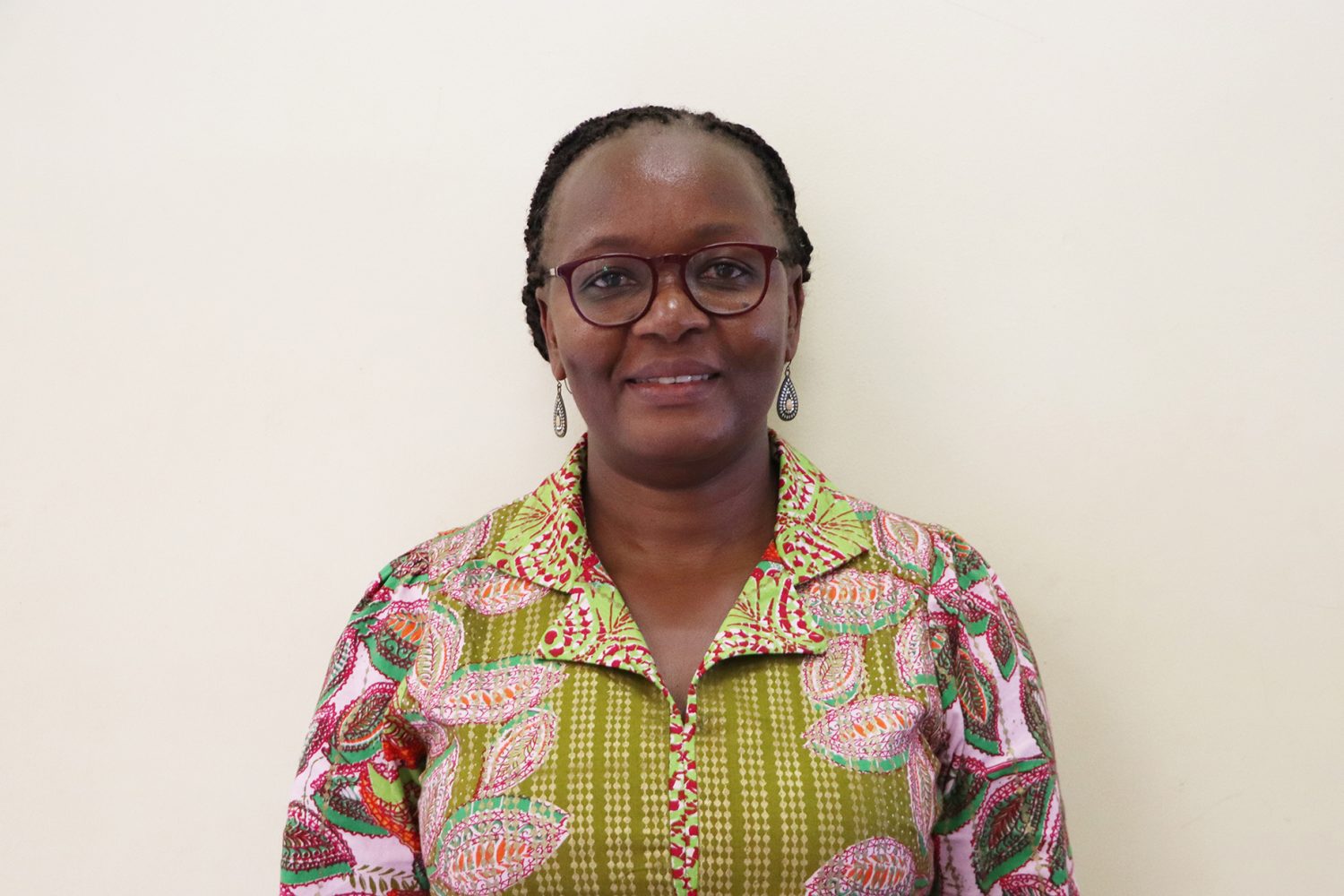
Message to Academic Staff
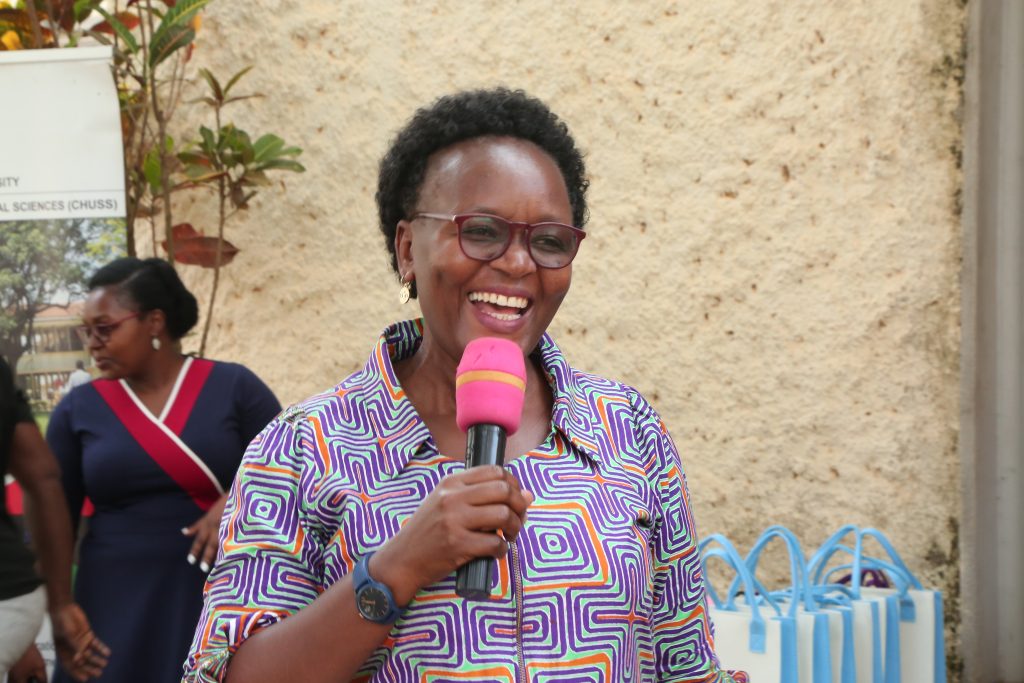
Q: What message do you have for your staff following this achievement?
Dr. Khanakwa:
First, I celebrate my staff and thank them for their dedication to supervision and student support. Academic work is demanding, and material rewards are often limited, but the true satisfaction comes from seeing students succeed.
I encourage my colleagues to remain committed. Yes, the workload is heavy, but many things are possible with dedication and teamwork. Let us continue working for the good of our students, our School, and Makerere University.
Leadership Rooted in Humility
Q: Many colleagues describe you as humble, down to earth, and hardworking. What shapes this character?
Dr. Khanakwa:
I think it is largely my upbringing. My mother was a primary school teacher from the 1950s until the mid-1980s. She worked extremely hard to raise us, combining teaching with farming to ensure we had school fees and basic needs. From her, I learned humility, discipline, and the value of hard work.
I also learned that leadership positions are temporary. You occupy them today, and tomorrow you move on. So humility is essential.
My graduate training also shaped me significantly. My PhD supervisor emphasized that graduate study is a full-time job and that results matter more than noise. Let people see your work through outcomes, not announcements.
Supervision as a Two-Way Commitment
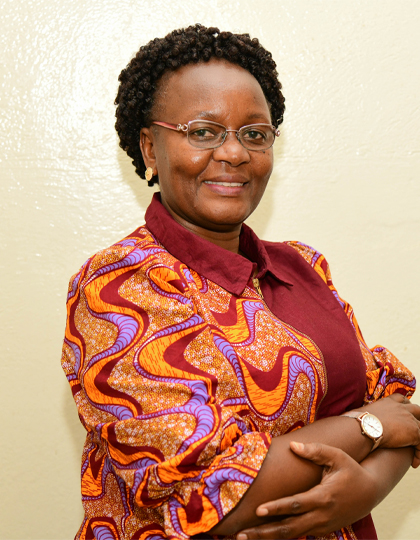
Q: How would you describe your supervision style?
Dr. Khanakwa:
I read my students’ work thoroughly, word by word. Sometimes my comments are tough, but they are honest. Supervision is a two-way commitment. I give feedback, but students must also respond and remain engaged. When that relationship works, progress happens.
Balancing Leadership, Scholarship, and Family
Q: How do you balance being a Dean, scholar, wife, mother, and daughter?
Dr. Khanakwa:
Honestly, I am not sure I balance perfectly. My mother lives far away in Bukwo, so visiting requires careful planning. My children grew up understanding the demands of academic life. I pursued my PhD in the United States and spent long periods away, but we adapted as a family.
Work has become part of my lifestyle. I use weekends to read dissertations, review manuscripts, and write. Sometimes my children ask if I ever sit without working, but this is the commitment I made. As we often say jokingly, “We humbly applied for the job, so let us do the job.”
Scholarship Beyond Supervision
Dr. Khanakwa is also an active scholar and editor. In the past year alone, she has:
- Edited scholarly volumes on archives, memory, method, and pedagogy
- Published a book with Routledge Companion
- Co-authored journal articles and book chapters with graduating students, including Priscah Asiimwe and Anatoli Lwasa Mpijja
“I feel an obligation to write with students,” she notes. “It takes time, energy, and commitment, but it is part of academic mentorship.”
Who Is Dr. Pamela Khanakwa?
Dr. Pamela Khanakwa is the Dean, School of Liberal and Performing Arts, College of Humanities and Social Sciences, Makerere University. She is a seasoned scholar, supervisor, administrator, and mentor whose leadership continues to redefine graduate training excellence. Details about Dr. Pamela Khanakwa can be accessed at: https://chuss.mak.ac.ug/en/personnel/pamela-khanakwa/
More details are available in her attached curriculum vitae.
The CHUSS End- Of-Year-Get-Together
On 12th December, 2025 the college leadership organised a get-together end of year gathering to take stock of the achievements, challenges and brainstorm together on how to move forward. The event was marked by entertainment, team building games, appreciation speeches, sharing a meal and a Christmas package for every staff
Retirees and staff recognised
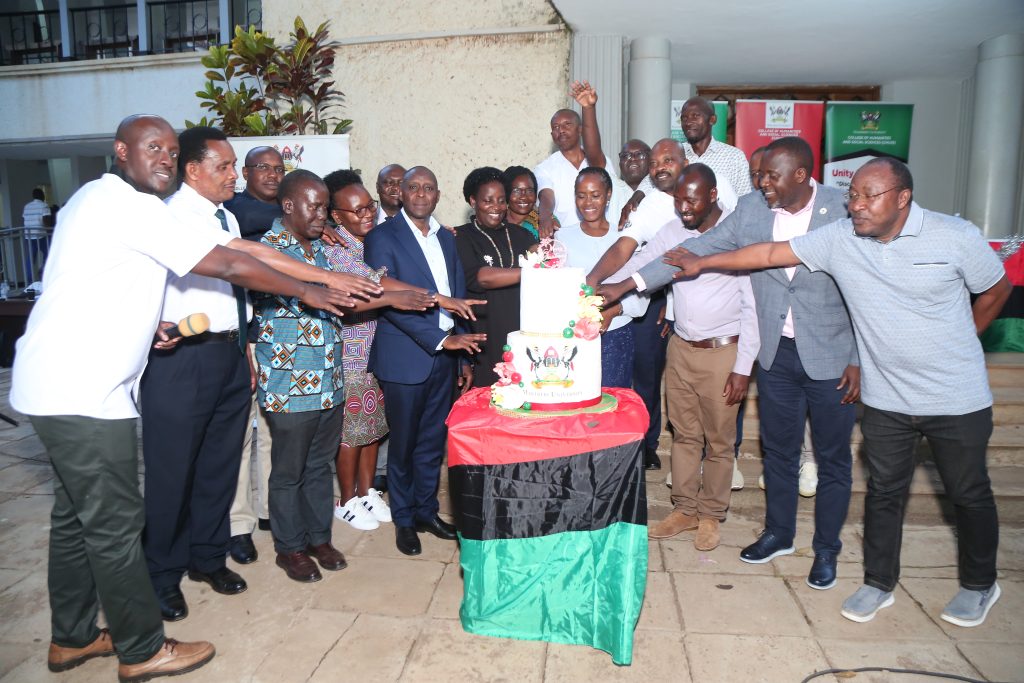
Five retired staff Dr. Micheal Wangotta Masakala, Dr. Anatole Kirigwajjo and Dr. Jackson Kizza Mukas (all from the School of Languages, Literature and Communication), Assoc. Prof. Florence Nansubuga (School of Psychology), Dr. Tusabe Gervase (School of Liberal and Perforing Arts) and Ms. Scovia Nganda Sekweyama (secretary from the School of Social Sciences) were recognised for their dedicated services to the university.
In addition to Dr. Pamela Khanakwa’s Award as Best PhD Supervisor and Dean, Ms. Birabwa Florence scooped the award of Best Registrar of the year. Birabwa is the registrar for the School of Liberal and Performing Arts.
Administrative and support staff including Ms. Mary Gyezaho and Annet Kashumbusha(both administrative secretaries in the Principals office), Farouq Lule (IT Officer), Godfrey Kakooza (cleaner), Charles Sebuguzi (driver) and Jane Anyango (Communications officer) were recognise with awards for outstanding service. Dr. Mohamed Mayanja Kajumba was from the School of Pyschology was recognised as the person with an outstanding talent in Handwriting.
The celebrations held in the Arts quadrangle were graced by the Vice Chancellor Academic Affairs Prof. Sarah Ssali and the Deputy Vice Chancellor in charge of Finance and Adminstration Prof. Ireeta Tumps.
Humanities & Social Sciences
Ugandan Journalists Trained on Peace and Gender-Sensitive Reporting Ahead of 2026 Elections
Published
1 month agoon
January 9, 2026By
Jane Anyango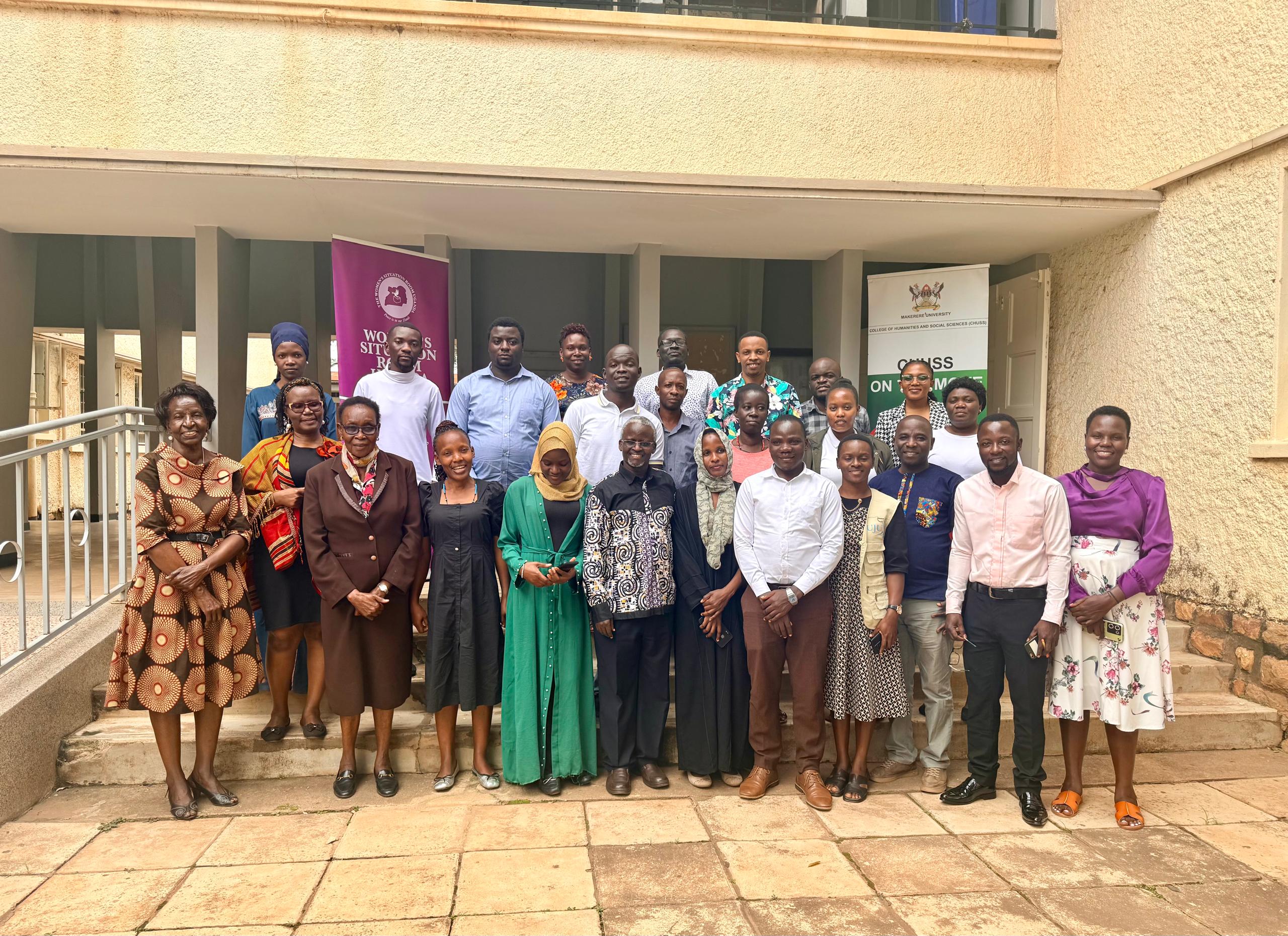
Kampala, Uganda – January 9, 2026
Ahead of the January 15 general elections, Ugandan journalists have undergone specialized training on peace and gender-sensitive reporting to ensure responsible media coverage during the election period. The two-day training, held from 8th to 9th January 2026 at Makerere University’s College of Humanities and Social Sciences Smart Room, was organized by the Women’s Situation Room (WSR) in partnership with various stakeholders and brought together journalists from across print, broadcast, and online platforms.
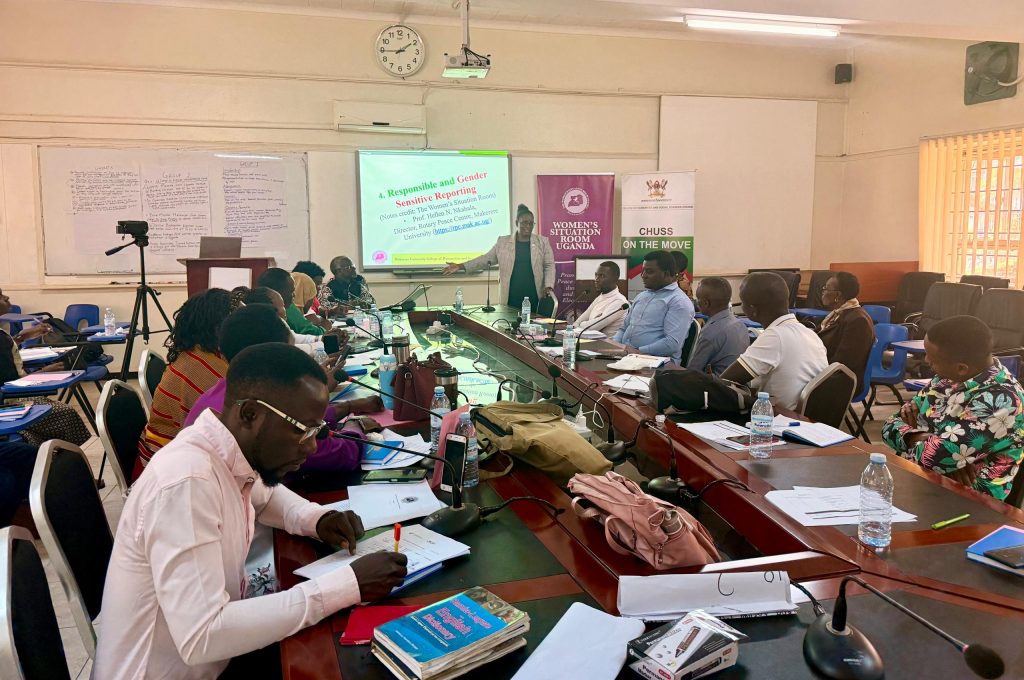
The main objective of the training was to strengthen the capacities of media in reporting and documenting electoral processes in a responsible and gender-sensitive manner. The specific objectives included: strengthening journalists’ skills to cover the 2026 elections in a fair, balanced, gender-sensitive, and non-violent partisan way; enhancing the role of media to enable citizens to be well-informed and actively participate in the election process; ensuring focused and balanced reporting on peace during and after elections; and strengthening partnerships between the WSR and media houses during the election period.
The training covered multiple critical modules. Day one focused on responsible conflict-sensitive reporting, emphasizing principles such as balance, impartiality, and accuracy. Participants explored the role of media as a relayer of the population’s voice, election monitor, catalyst for social cohesion and reconciliation, contributor to the accountability of political actors, and a platform for detecting and debunking digital media misinformation and hate speech.
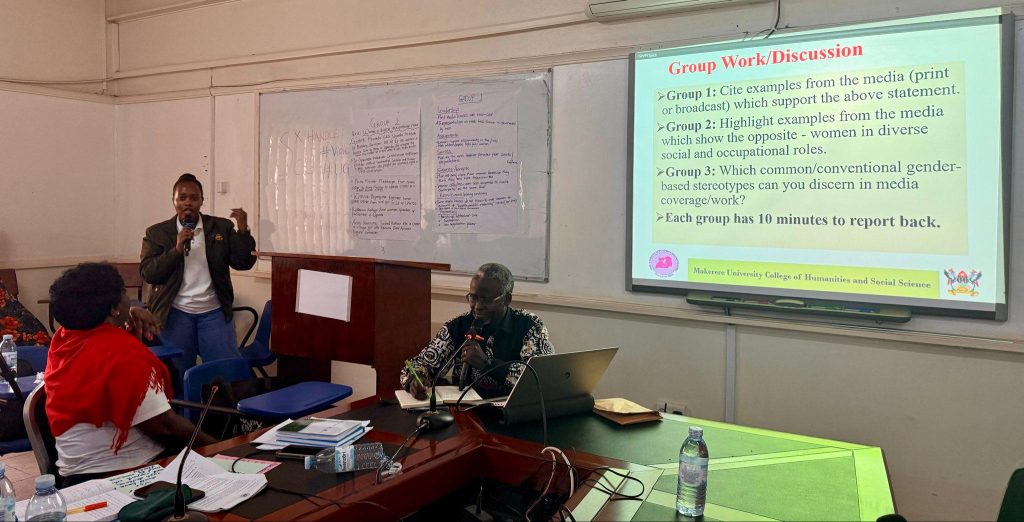
Day two addressed responsible and gender-sensitive reporting. Key aspects included the definition of gender-sensitive reporting, how to become a gender-sensitive reporter, critical elements in reporting with gender awareness, packaging gender-sensitive stories, and a checklist for detecting and avoiding gender-insensitive reporting.
Her Lordship, retired Judge Justice Mary Mayitum, emphasized the importance of peace as the foundation of development and democratic engagement. “Because we value peace more than anything. Without peace, really, you can do nothing. But where there is peace, you can have time to reflect, discuss with others, and join in meaningful dialogue,” she said. She warned that the country’s past conflicts, such as those in Gulu, underscored the necessity of maintaining national harmony.
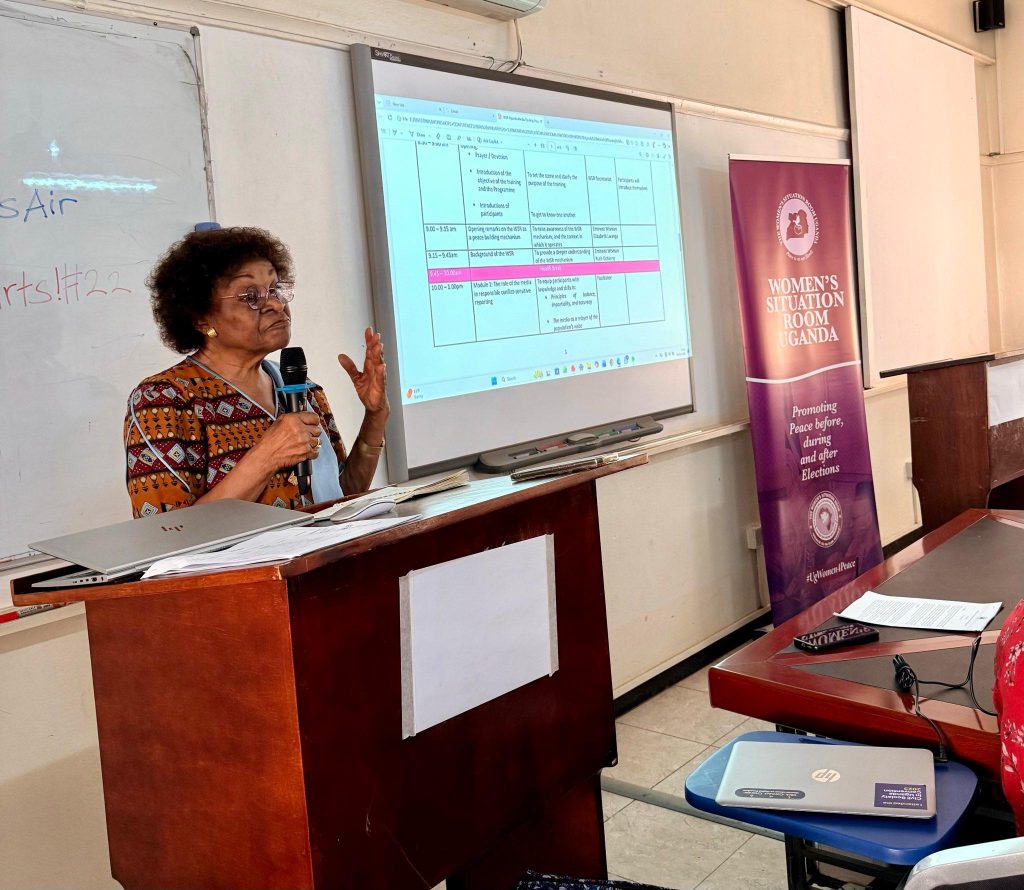
Justice Mayitum also urged other key election stakeholders to uphold peaceful conduct. “Being peaceful is the very heart of life. We have spoken to police, security personnel, political parties, and the Electoral Commission. We want politicians to have a code of conduct and to understand that it’s okay to think differently without fighting or hating one another,” she added.
Dr. William Tayebwa, lead facilitator and senior lecturer in the Department of Journalism and Communication at Makerere University, said, “This training is about conflict-sensitive reporting, peace journalism, and gender-sensitive reporting in the context of the elections. The emphasis was on giving female political candidates a voice while ensuring journalists report responsibly on election-related matters.”
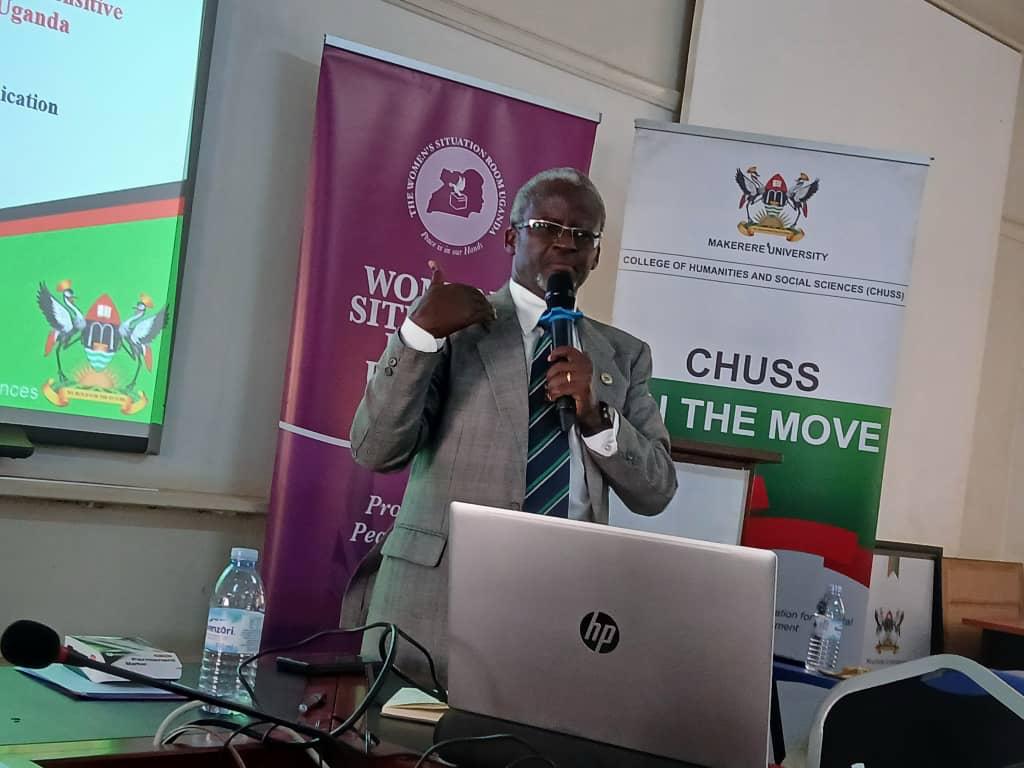
Participants described the training as timely and impactful. Tony Banizengabo of CBS Wakiso District said, “We’ve benefited a lot. We’ve been trained to write stories which bring peace, not conflict. Ahead of the elections, we are very ready to be part of peacemakers.”
Dorcas Kimono of UBC TV Kampala added, “It was so timely and rich. We learned how to report without promoting or fueling violence, giving voice to victims without angering them or encouraging violators. This is very vital, especially as we approach the 2026 elections.”
The training aims to equip media personnel with the knowledge and skills to uphold professional ethics while contributing to a peaceful, inclusive, and gender-sensitive electoral process.
Humanities & Social Sciences
CHUSS Invests Over UGX 100 Million in Interactive Smart Screens, Upgrades Teaching Infrastructure
Published
1 month agoon
January 9, 2026By
Jane Anyango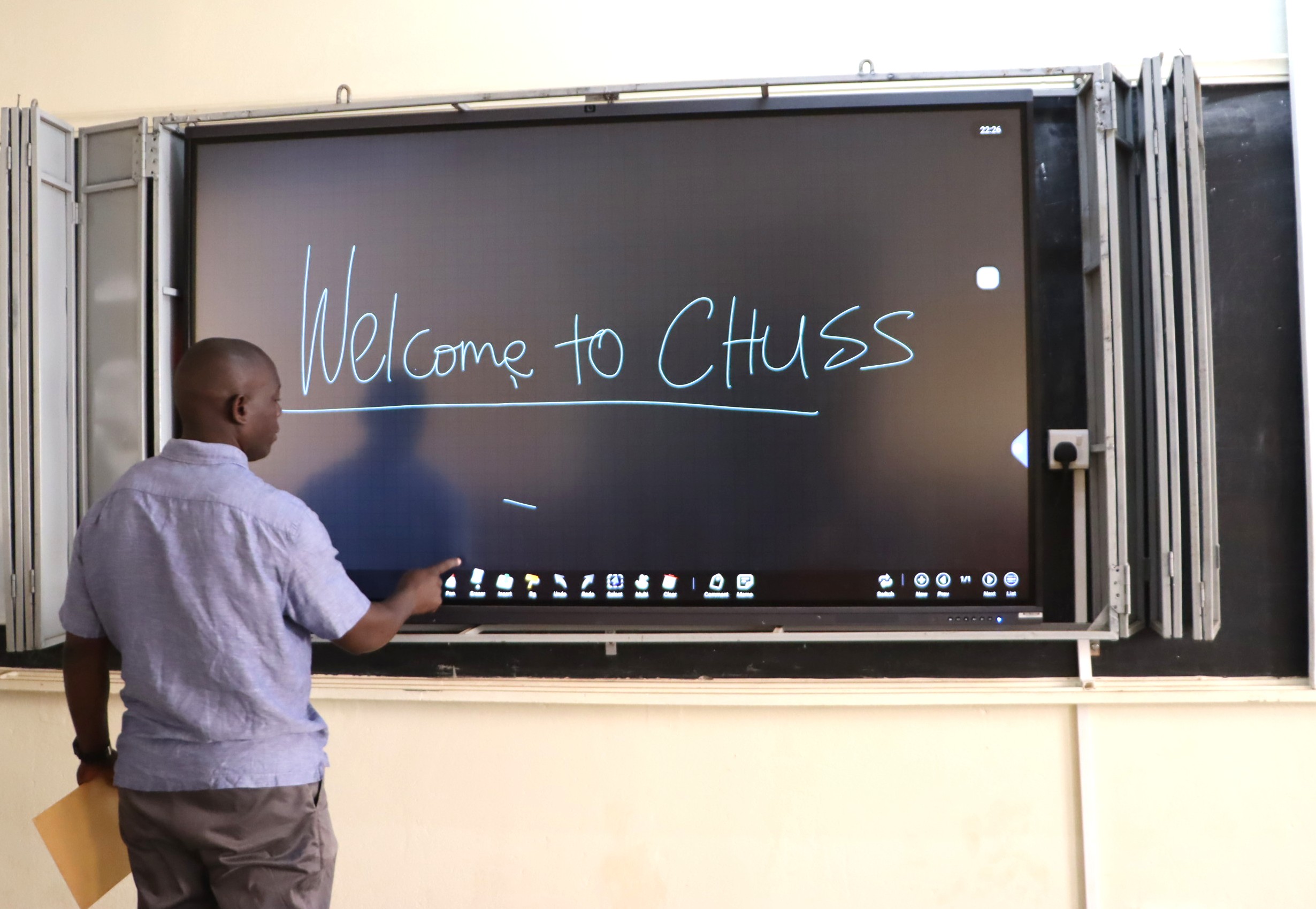
The College of Humanities and Social Sciences (CHUSS) has invested over UGX 100 million in the acquisition and installation of state-of-the-art interactive smart screens, marking a major step in strengthening digital teaching and learning at Makerere University.
Under the investment, 86-inch interactive 4K smart screens have been installed in major lecture rooms across the college’s schools, replacing traditional projectors and whiteboards. The upgrade is intended to modernise instructional delivery, enhance student engagement, and support blended and hybrid learning models.
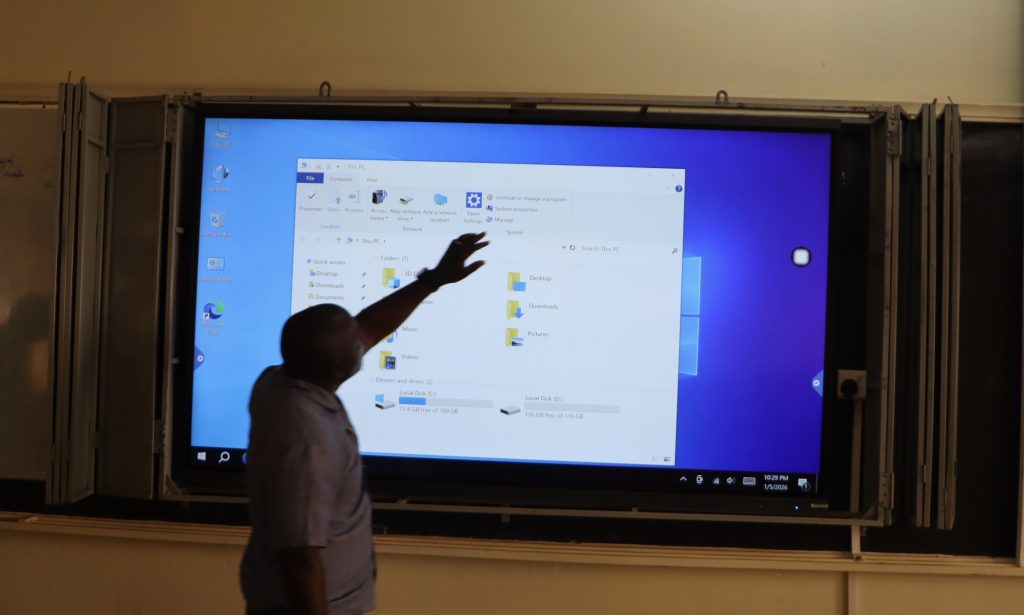
The touch-sensitive smart screens enable lecturers to write, draw, and annotate content directly on the display, while simultaneously integrating multimedia resources such as videos, presentations, and online materials. The screens support wireless screen casting from laptops, tablets, and smartphones, allowing for smooth, cable-free presentations and real-time sharing of students’ work during lectures and group discussions.
Designed to promote interactive and learner-centred pedagogy, the smart screens feature multi-touch capability that allows several users to interact with the board at the same time. This functionality supports collaborative learning, problem-solving exercises, and group presentations, making lessons more engaging and inclusive for students with diverse learning styles.
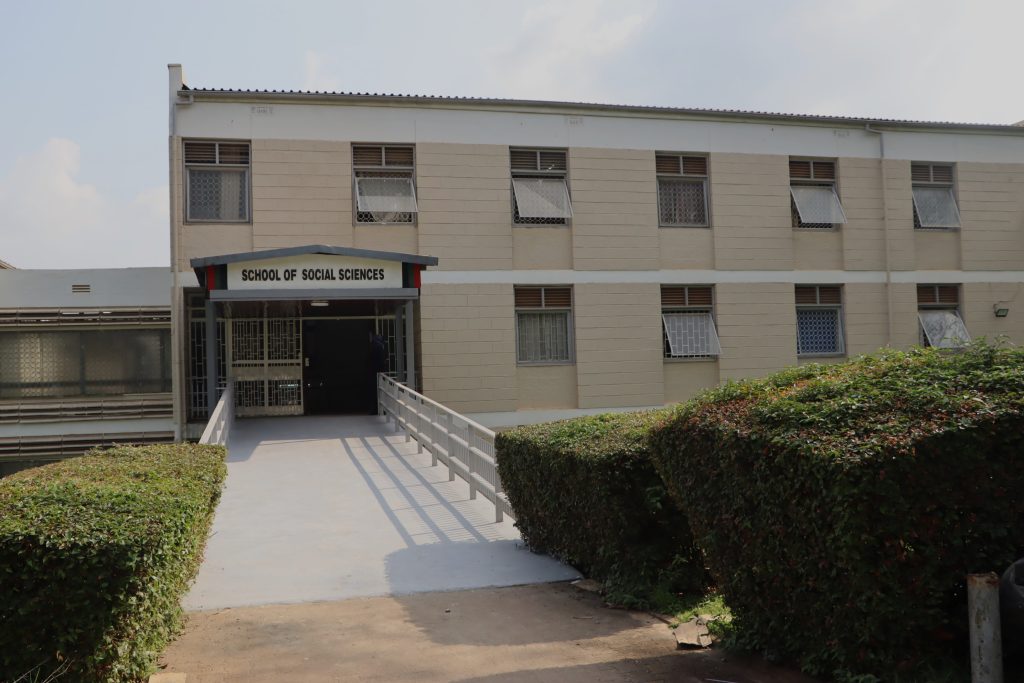
The boards are equipped with built-in cameras, microphones, and speakers, enabling seamless hybrid teaching through platforms such as Zoom, Microsoft Teams, and Google Meet. This allows lecturers to conduct virtual and physical classes simultaneously, record full lectures, and share them with students for later review, revision, or catch-up purposes.
Running on dual Android and Windows operating systems with full internet connectivity, the smart screens provide direct access to online academic resources, digital libraries, and learning management systems. Their AI-powered features further enhance lesson organisation, content clarity, and efficient, paper-free instruction, contributing to a more sustainable learning environment.
To ensure safety and prevent misuse, the smart screens are secured in fabricated metallic safety boxes installed in the lecture rooms.
Beyond digital infrastructure, CHUSS has also undertaken additional physical improvements. The Russian Lecture Room in the School of Languages, Literature and Communication has been furnished with new chairs, tables, and a projector screen, significantly enhancing its teaching environment.
The college has further improved staff working spaces, with the School of Psychology renovating office space and classrooms in Block A, while similar renovations have been carried out in the School of Social Sciences.
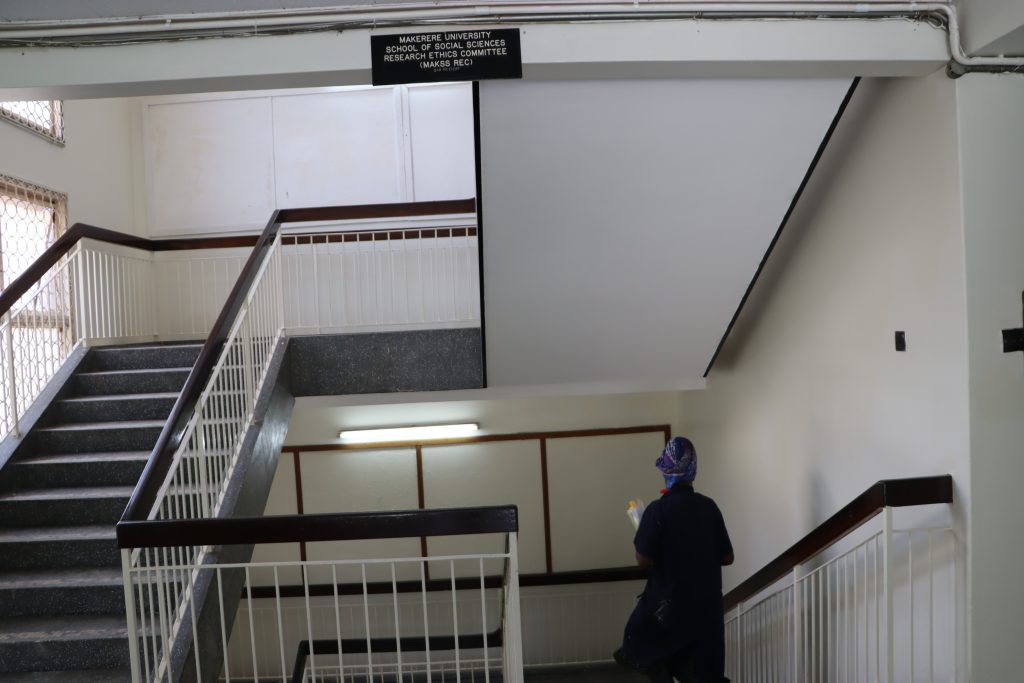
The infrastructural upgrades underscore CHUSS’ commitment to improving the quality of teaching, learning, and staff working conditions in line with Makerere University’s digital transformation agenda.
Trending
-

 General2 weeks ago
General2 weeks agoAptitude Exam (Paper 1) Results for the Mature Age Entry Scheme 2026/2027
-

 Health4 days ago
Health4 days agoUganda has until 2030 to end Open Defecation as Ntaro’s PhD Examines Kabale’s Progress
-

 Health2 weeks ago
Health2 weeks agoHow Jimmy Osuret Turned Childhood Trauma into Evidence for Safer School Crossings
-

 General2 weeks ago
General2 weeks agoFor Youth by Youth – Call for Second Cohort Applications
-

 General4 days ago
General4 days agoMastercard Foundation Scholars embrace and honour their rich cultural diversity
